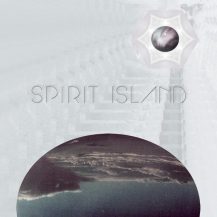Samuel Shaffer’s – “Spirit Island EP”
“Spirit Island shows us that Sam is in tune with himself and others, and it’s a wonderful melody.” -HC
Hannah Cook
8.5
out of 10
Samuel Shaffer
Spirit Island EP
July 23, 2013
After the first song off Spirit Island ends and before the next begins, there are about two minutes where all you hear is Sam Shaffer picking and sliding along an acoustic guitar. He fumbles around with the grace only a true guitar expert could have—not planning where his fingers will land next on the fret board but trusting it’ll be in the right place at the right time. It hardly ever fails him.
With a keen ear, one soon realizes that it can’t possibly be just any old guitar. You can hear its heavy strings wobble and thump by the creaking, wise conduct of an age-old instrument. It must be slightly flat, slightly bent and chipped in places it shouldn’t be. It must be older than Sam is.
Alas, the guitar is something like a family heirloom, more than 50 years old with only three of its strings left. It belonged to Sam’s grandfather who passed away when Sam was young, but you could say his memory lives on in the form of that guitar. When Sam plays it, it’s like he’s combining the forces of this world we live in and those of the “other.” He’s turning an abstract concept—being connected to a passed away life–into a tangible piece of music.
But it’s not a ghost story.
The overriding theme of Spirit Island is in keeping with metaphysical ideas. It’s a collection of thoughts, most of which were extracted from dreams and daydreams, with no essence in plain sight. They are true exhibitions of just how transcendental the mind can be.
Sam’s approach to writing Spirit Island was both youthful and wise. On one hand, he let his imagination run riot–like children do when they rarely dismiss a thought they have as useless. Every musing deserves a voice otherwise what’s the point?
Listen to the closing title track and hear phrases like “Time was a song neatly woven until nothing wrong” and “forever songs,” which perhaps hint at what it would be like living in a world where time is not of the essence, where things could very well last forever. It’s an innocent thought, one that children lose as they grow older and experience how living anymore depends on time.
Listen to the closing track, “Spirit Island”:
[soundcloud url=”http://api.soundcloud.com/tracks/102348010″ params=”” width=” 100%” height=”166″ iframe=”true” /]
On the other, it takes sophisticated understanding to be able to use language to make sense of some of these things, and to also make sense of the fact that, well, lots of things in life just don’t make sense. “I don’t understand the depth of my questions and I know the answer is done, it is not said. And if confusions better than conclusion then what has it done to me?” Sam sings in “Dream World,” posing questions with no answers, which in a sense is the answer.
Spirit Island was spawned from Sam’s ability to trust his instincts. Only “Walpurgisnacht” and “Shared Delusions” were written entirely before recording while the rest evolved as the process went along. “Carrier,” for instance, was nearly completely improvised, which is hard to believe given that all the layers, from the steady strums to the gentle harmonies to the weirder bits of otherworldly-esque tones, sound well planned out and like they should have come from a few different heads.
But because Sam was not tied down to any one idea, he was able to create an album that, from one song to the next, sounds completely different. He’s taken influences from far and wide and has turned them around into songs that then reach farther and wider.
It is that open-minded ability to diversify that Sam succeeds so well with this album. He has mastered a million things, both musically and more: the ability to question, to combine, to remember and listen. Spirit Island shows us that Sam is in tune with himself and others, and it’s a wonderful melody.
-Hannah Cook, August 16, 2013